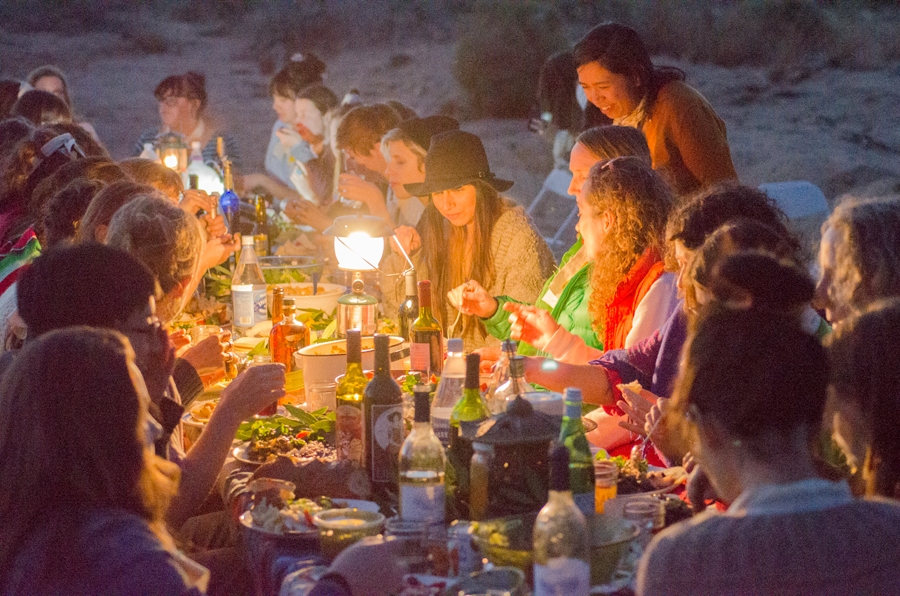Collective – participation porous, generally anarchic and there really isn’t any money in it.
Los Angeles collectives – I have participated in the last year, in one form or another, in almost all of them. I have wandered in off the street and picked up an instrument, stood pressed in a throng bathed in sweat and sound, organised talks and screenings, lectured and discussed, written and edited, and even produced a public-service announcement about colour.
Collectives and collective artmaking are hardly new, but emerging out of a former kung-fu movie theatre and dank offices above a pho shop, in the backroom of a witchy boutique, tucked into a rehabbed warehouse, collectives in Los Angeles have flourished and morphed into collaboratives. Though essentially synonymous, the difference is that collaboratives are about making space rather than defining content. Some are more hierarchical than others, but loose volunteerism and openness still prevail even within the ones governed by boards or chief provocateurs. Members are generally self-selecting and authority accrues through involvement.
Emerging out of a former kung-fu movie theatre and dank offices above a pho shop, in the backroom of a witchy boutique, tucked into a rehabbed warehouse, collectives in Los Angeles have flourished and morphed into collaboratives
Emerging more from punk than from Marxism – though Marxists are welcome too – these new collaboratives help create an environment in which art might happen. The first began almost a decade ago, and its former participants are now scattered through the rest. Piero Golia and Eric Wesley began the Mountain School of Arts (MSA) in 2005 out of the nowdefunct Mountain bar in Chinatown to give the community the experience of a school without the crippling debt and accreditation of a graduate programme. Though Golia has long acted as the primary organiser, the school functions through a collective of volunteers; it takes in no money and thus pays no salaries. The application process is modest and includes no images of artwork. The school, approaching its tenth anniversary, has gone nomadic, but it is still defined by exemplary lectures from artists (Dan Graham, Pierre Huyghe and Paul McCarthy among them) and experts as well as the growing community of students drawn to Los Angeles from the rest of the world.
Around the corner from the Mountain, in a space formerly occupied by David Kordansky Gallery, is Human Resources, which emerged as a space primarily for performance (both art and music) as well as exhibitions – from one-day art shows for soon-to-be-shipped-off paintings to queer operas and incidental screenings. The crew that runs Human Resources is the only formalised collective in the classic sense, but the space always seems wholly open to the community.
KCHUNG, just a block away, was born from the ire of MSA alumnus Solomon Bothwell. It was in a class I was leading at MSA, actually, that a lecturing public-radio producer pissed him off. Disgruntled about the limitations of content on public radio, he decided to start his own station. Tapping artist-friends Luke Fischbeck of Lucky Dragons and Harsh Patel, two other MSA graduates, KCHUNG began in a basement on Chung King Road with a barely legal, unlicensed shortwave and online broadcast. The station has metastasised with a shifting cast and dozens of shows, from ephemeral one-offs to weird stalwarts. Just about anyone who wants can have a show, with dues of merely $10 a month, and most everyone I know has a show or has been on one. Programmes include hip hop and experimental music jams, art talkshows and chitchatting skaters. Yelena Zhelezov gives on-air running descriptions of movies she’s watching; scholar Norman Klein regularly waxes philosophic; and the Hammer’s recent Made in LA 2014 Public Recognition Award-winner Jennifer Moon presents her revolutionary self-help show.
The most recent collective project is the Women’s Center for Creative Work (WCCW), which emerged out of a women-only dinner started by Kate Johnston, Sarah Williams and Katie Bachler (with whom I started the equally volunteer-run Art Book Review). The dinner became a regular event, with diners numbering over 100. Out of it emerged a book group, storytelling gatherings, tarot card readings, comedy acts, workshops for basket-weaving and doll-making, and an art-typical spate of residencies, panels and talks. The simple twin premises of their collective? ‘Feminism is for everybody!’ and ‘A network of rad women’. The WCCW feels like an important local spark for a new wave of feminism, one that is inclusive and invites supportive community rather than ideological posturing.
There is a very sound argument that artists should get paid, but there’s also the agency of working outside of traditional systems of patronage and profit economies
As far as I know, every single person involved with these groups is a volunteer. Though I have mentioned individual names, there are scores of others equally important who make these projects thrum with life. There is a very sound argument that artists should get paid, but there’s also the agency of working outside of traditional systems of patronage and profit economies, of the DIY ethos that you make the world you want to live in by direct action and grassroots organising. Each of these projects attempts through its actions to make space for others, to encourage individual making within a community.
These groups do the important work that Italo Calvino describes at the end of Invisible Cities (1972), where he writes that even if we’re in hell, we can ‘seek and learn to recognise who and what, in the midst of the inferno, are not inferno, then make them endure, give them space’.
This article was first published in the October 2014 issue.
